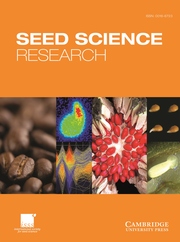No CrossRef data available.
Article contents
Changes in protein synthesis in embryonic axes after long-term storage of maize seeds
Published online by Cambridge University Press: 19 September 2008
Abstract
The aim of this work was to analyse the capacity for protein synthesis in embryonic axes from long-term-stored maize seeds, including the role of proline. Embryonic axes from seeds stored for 13 years (S) and non-stored seeds (NS) were incubated in nutrient media after application of [14C]proline. Transformation of [14C]proline into other amino acids was analysed by thin-layer chromatography. After 6 h of incubation, no other labelled amino acids were found. Incorporation of 14C into total soluble and cell-wall (proline-rich) proteins was assessed during this period. Incorporation of [14C]proline into specific cell-wall proteins was lower in S than in NS axes.
Studies using [35S]methionine showed that protein synthesis was slower in axes of S than in NS seeds. Analyses of these proteins by gel electrophoresis and fluorography revealed qualitative differences between the [35S]methionine proteins synthesized by both types of axes. The NS: S ratios for the [35S]proteins were larger than those from the [14C]proline assays. These data may be interpreted as an indication of differential deterioration of transcription or translation in the axes during long-term seed storage.
- Type
- Research Papers
- Information
- Copyright
- Copyright © Cambridge University Press 1992


